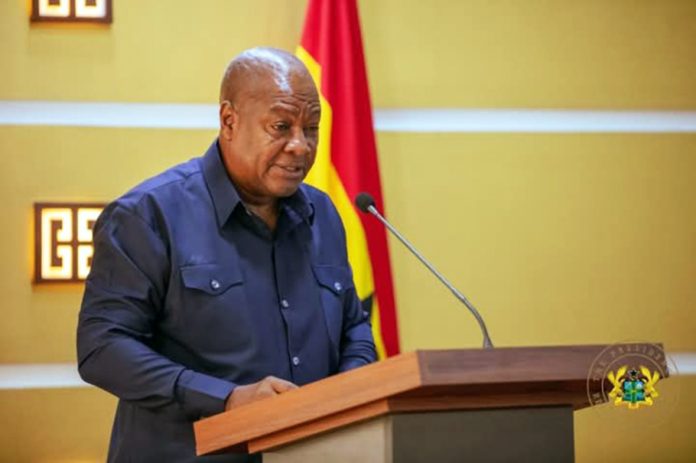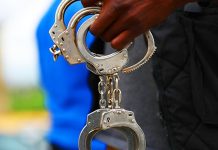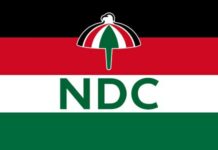The Ghana Environmental Advocacy Group (GEAG), a civil society organization committed to safeguarding Ghana’s natural resources, has petitioned President John Dramani Mahama over, what it describes as, the devastating impact of offshore oil operations and foreign industrial fishing on the coastal environment and livelihoods in Southwestern Ghana.
From Jomoro to Ahanta West, the group accuses multinational oil and gas companies, along with foreign fishing interests, of causing widespread environmental degradation and deepening poverty among coastal communities.
In a petition copied to the Ministry of Energy and Green Transition, Ministry of Fisheries and Aquaculture Development, the Chief of Staff, Office of the President and the Western and Central Region Parliamentary Caucuses, the group urged urgent reforms in Ghana’s energy and fisheries policies.

According to GEAG, these reforms must promote equity, ecological integrity, and long-term sustainability for citizens living along Ghana’s coast. In total, there are four major offshore drilling projects currently operating in Ghana’s Southwestern waters, namely the Jubilee Field, TEN Field, Sankofa/OCTP Block and West Cape Three Points Block, with multiple Ghanaian service companies supporting these operations.
Offshore Oil Disrupting Marine Life
The group alleges that since Ghana’s discovery of commercial oil reserves in 2007 and the start of offshore production at the Jubilee Field in 2010, coastal communities have experienced a worsening crisis in livelihoods, food security, and marine ecosystem health.
“The rapid expansion of oil and gas infrastructure, ranging from seismic surveys to FPSOs (Floating Production Storage and Offloading units), has significantly disrupted marine ecosystems. Communities from Ahanta West to Jomoro, who rely heavily on artisanal fishing for income and sustenance, have reported a sharp decline in fish stocks,” the petition said.
GEAG blamed seismic noise, heavy vessel activity, oil spills, and routine discharges for driving fish away from their natural breeding grounds and polluting important fishing waters. They also decried the expansion of oil drilling exclusion zones, which have displaced artisanal fishers without compensation or viable alternatives.
In addition to the environmental woes, GEAG highlighted the ongoing threat of illegal, unreported, and unregulated (IUU) fishing pointing to foreign trawlers operating under Ghanaian flags through questionable joint ventures, which frequently encroach on artisanal fishing zones.
“These vessels engage in destructive practices like bottom trawling, harvesting juvenile fish, and undermining local livelihoods through the said fishing method, an illicit transhipment method where bycatch is sold at sea to local canoes,” the group explained.
Such activities have sparked physical confrontations, damaged fishing gear, and forced local fishers out of productive zones. GEAG cited data from the Environmental Justice Foundation, which estimates Ghana loses over $50 million annually to illegal fishing. Small pelagic fish stocks, such as sardine, have reportedly declined by 86% since 1990, further compounding food insecurity.
According to the group, the combined pressures of oil exploration and IUU fishing have pushed many coastal dwellers into poverty and food insecurity. Fishers report dwindling incomes, while fishmongers, predominantly women, face raw material shortages, which are threatening their livelihoods.
The collapse of the fishing sector is also driving youth migration, with many young people abandoning fishing for unstable urban jobs or embarking on dangerous migration routes abroad. GEAG warned that traditional fishing knowledge and cultural practices are fading, as they are no longer economically viable or socially relevant in the current climate.
Policy Recommendations for President Mahama
In response to the crisis, GEAG has presented a set of policy recommendations for the Mahama administration to consider. The group called for compensation for fishers displaced by oil exclusion zones and urged the government to fund and scale up alternative livelihood programs such as agribusiness, aquaculture, and eco-tourism.
It also proposed the enforcement of existing laws on IUU fishing and stricter regulation of foreign trawlers. GEAG recommended a ban on industrial bottom trawling that targets juvenile fish and called for Ghana’s alignment with FAO standards and the Fisheries Commission’s gear regulations.
The group further advocated for rigorous environmental monitoring by implementing independent Environmental Impact Assessments (EIAs) and Environmental and Social Impact Assessments (ESIAs) for all oil activities emphasizing the need for regular assessments of water quality, marine biodiversity, and health outcomes in coastal communities located near oil fields.
GEAG also called for the full inclusion of coastal communities in decision-making processes, especially on zoning, compensation and monitoring. It proposed the establishment of vessel-tracking systems and community-led marine monitoring programs, supported by civil society organizations.
The group also urged the government to allocate a share of oil and fishing revenues directly to improving coastal healthcare facilities and supporting communities impacted by pollution and environmental stress.
Livelihoods Are Being Erased
GEAG concluded its petition by asserting that the coexistence of offshore oil operations and foreign commercial fishing with traditional livelihoods is not sustainable. It warned that without bold policy reforms and targeted interventions, the entire coastal economies and cultures may be wiped out.
“Without bold policy reforms and justice for coastal communities, we risk wiping out entire generations of traditional livelihoods. The future of Ghana’s coast depends on decisive leadership,” the group emphasized.
Meanwhile, The Chronicle reached out to the Petroleum Commission and the Ghana National Petroleum Corporation (GNPC) via email to seek their response to the allegations raised by the Ghana Environmental Advocacy Group, but at the time of going to press, both institutions had not responded to the questionnaire submitted.









